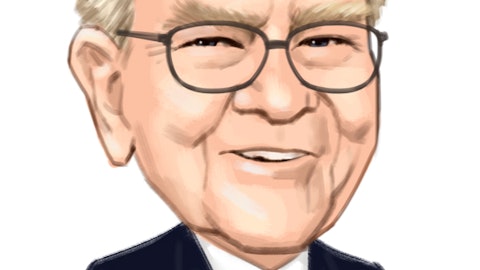TSS, Inc. (PNK:TSSI) Q2 2023 Earnings Call Transcript August 18, 2023
Operator: Ladies and gentlemen, thank you for standing by. My name is Brent, and I will be your conference operator today. At this time, I would like to welcome everyone to the TSS Second Quarter 2023 Earnings Call. All lines have placed on mute to prevent any background noise. After the speakers remarks, there will be a question-and-answer session. [Operator Instructions] Thank you. It is now my pleasure to turn today’s call over to Mr. John Penver, Chief Financial Officer. Sir, please go ahead.
John Penver: Thank you, Brent. Good afternoon, everyone. Thank you for joining us on TSS’ conference call to discuss our second quarter 2023 financial results. I’m John Penver, the Chief Financial Officer for TSS. And joining me today on the call is Darryll Dewan, the President and Chief Executive Officer for TSS. As we begin the call, I would like to remind everyone to take note of the cautionary language regarding forward-looking statements contained in the press release that we issued today. That same language applies to comments and statements made on today’s conference call. This call will contain time-sensitive information as well as forward-looking statements, which are only accurate as of today, August 14, 2023. TSS expressly disclaims any obligation to update, amend, supplement or otherwise review any information or forward-looking statements made on this conference call or the replay to reflect events or circumstances that may arise after today’s date, except as otherwise required by applicable law.

Copyright: limonzest / 123RF Stock Photo
For a list of the risks and uncertainties which may affect future performance, please refer to the company’s periodic filings with the Securities and Exchange Commission. In addition, we will be referring to non-GAAP financial measures. A reconciliation of the differences between these measures with the most directly comparable financial measures calculated in accordance with GAAP is included in today’s press release. Darryl will kick today’s call off with an overview, and then I will provide a review of our second quarter ’23 results and then turn the call over to Darryll to further discuss our strategy and company direction. Darryll?
Darryll Dewan: Thank you, John. Earlier today, we released a press release announcing our financial results for the second quarter of 2023. A copy of that release will be made available on our website at www.tssiusa.com. Overall, we achieved very good financial results in Q2. We announced in our last earnings call that we would focus on three key areas, and we’re glad to report solid progress in each. Number one, improve our systems integration processes and business model. Number two, pursue and place talent to prepare for and accelerate our growth. And number three, to develop a strategy to capitalize on emerging markets. First, through successful restructuring of our systems integration business, where we were formally in a loss-making position, we have proven our capability to cater to complex and demanding customer build requirements and adapt our business to changes in demand.
Our efforts have led to increased efficiency and profitability in Q2 and have paved the way for continued growth and success. Second, we committed that we will selectively invest in our leadership team, and we announced the addition of Janet Morrison as our Chief People Officer and Corporate Communications Leader. Janet is working closely with our team to assess our talent needs to drive and support our growth. She will also lead our effort to publicly share news about our key wins, company awards and major accomplishments. Third and very exciting for us all is we embarked on a plan to enhance our core selling strengths and develop new capabilities to tap into fresh markets for sustained growth. We are evaluating multiple go-to-market routes for the modular data center business that we expect will drive significant long-term growth.
We’re already making progress with our sales plan. Jim Olivier, the Senior VP of Sales, is leading the effort, working closely with Jim Woodward, the Director of Facilities Management Services and Leader of our Development and Facilities Management business. They’re working closely together to identify exciting new opportunities. We’re exploring ways to solve supply chain issues to minimize the long lead time for certain modular data center components. Much of our excitement is fueled by the market opportunity to create and deploy new solutions. We will invest resources to focus on demand gen to address these opportunities and, in other words, to sell our integration services. We will cover more of this later in our call. I am focused on building a management team of A players.
We have talked about this before. We will drive our growth strategy by forging new competencies in building direct connections with end users of the IT markets we serve while enhancing our existing OEM partnerships. Our Q2 focus ensured we hire the right talent to drive tactical business while evaluating where to invest selling resources to achieve our next level of strategic goals. We anticipate that our third quarter results will reflect a continued increase in revenues compared to 2022 and that we will maintain our profitability. There is a growing expectation for macroeconomic slowdown and our main customers are voicing their expectation for a temporary slowdown in demand. We have already taken action to address this in Q3. I’ll dive into this further, but let me first turn the back — turn this call back over to John to provide some financial details.
John?
John Penver: Thanks, Darryll. As Darryll said, looking at our second quarter, the results were very strong with year-over-year growth in revenue, gross and operating profit and adjusted EBITDA. The two reseller transactions that we mentioned on our last quarter that had slipped from Q1, both closed during the second quarter and helped drive these strong results. Our revenues were up 126% compared to the second quarter of 2022, and despite higher operating expenses, we were able to improve our adjusted EBITDA as well. So let me go into the details. Our total revenue for the second quarter of 2023 was $14.5 million. This represented growth of $8.1 million or 126% compared to the total revenue of $6.4 million that we had in the second quarter of 2022.
This also compares favorably with the $6.6 million of revenue we had in the first quarter of 2023. This growth was primarily from a $9.8 million increase in our procurement and reseller activities compared to 2022 and an increase of 16% or $0.3 million in our integration business. This was offset by a $2 million decrease in our facilities revenue as the number of modular data center deployments has fallen since 2022. As I just indicated, the most significant change in the second quarter was from the growth in revenue and profits from our procurement and reseller services. The timing and volume of these resell and procurement transactions is often beyond our control. During the second quarter of 2023, we had 45 reseller transactions, 34 of which were what we call agent-type transactions where we recognized GAAP revenue at the amount of any fee or commission that we were paid.
Now the gross value of some of these agent transactions can be quite large. So the gross value of all the procurement and reseller transactions processed during the second quarter was $42.9 million compared to $6.7 million in the first quarter of 2023 and $4.3 million in the second quarter of 2022. But based on the accounting treatment of the agent transactions, we recorded $10.6 million in revenue during the quarter. We do recommend that our investors focus on the gross profit generated by this business, which we’ll continue to report. We finance most of these procurement and reseller transactions for a short period of time, so higher interest rates do impact this business. And our interest expense associated with these transactions of $628,000 during the second quarter was up substantially from $90,000 in the first quarter of 2023 and $90,000 in the second quarter of 2022 because of the higher gross value of transactions financed.
We have increased our pricing for procurement services in the latter part of ’22 to account for the higher interest rates and to protect our profits. Our Systems Integration business had 16% growth in revenue compared to the second quarter of 2022 driven by strong RAC integration business, more fulfillment projects and offset by a decrease in modular data center fit out revenues as the level of MDC deployments has decreased. Our RAC integration revenues are up 48% or $0.9 million in 2023 due to higher demand from our OEM partners. Our Facilities business, which includes our modular data center deployment and maintenance services, generated $2.4 million of revenue during the second quarter of 2023. This was $2 million or 57% lower than such revenue in the second quarter of 2022.
Our recurring revenues from maintenance contracts have increased by 18% since last year due to a higher number of MDCs under annual maintenance contracts, and this helped offset the $2.1 million decrease in the one-time deployment project revenue as the number of new deployments has fallen compared to last year. We anticipate that our level of system integration services, particularly RAC integration will slow in the third and the fourth quarter of this year before rebounding next year based on forecast from our customers. As a result, in August, we’ve adjusted our staffing levels in the integration business to reflect this decreased demand but to ensure we effectively manage our labor costs, which is our largest operating cost in the integration unit.
Our production schedule is still impacted by the availability of components needed in production, while the supply chain issues are not as severe as we experienced in 2022. For the year-to-date six-month period ended June 2023, our total revenues of $21.1 million are up by 82% or by $9.5 million from the $11.6 million that we recorded in the first half of 2022. Like the trends in our Q2 revenue, the growth in 2023 has been driven by a $9.8 million increase in our procurement and reseller business, a 46% or $1.6 million increase in our integration revenues and a decrease of $1.9 million or 33% in our facilities revenue, that is from a decrease in the MDC deployments. So for the first half of 2023, we processed 76 procurement and reseller transactions, of which 60 were agent-type transactions.
The gross value of transactions processed in the first half of 2023 was $49.6 million, and that translated into $12.3 million of revenue for GAAP purposes and $1.9 million of gross profit. This compares to the first half of 2022, where we processed 38 transactions, of which 35 were agent-type transactions, and the gross value of those transactions was $14.6 million, which was reported as $2.5 million of GAAP revenue and $0.4 million of gross profit. Our gross profit margin of 22% during the second quarter was down from 41% in the second quarter of 2022 and down from 26% in the first quarter of 2023. Our gross profit margin is directly influenced by several factors, including the mix of revenues between system integration, facilities maintenance and procurement and reseller services.
We make a lower margin on our procurement and reselling activities. So as this business represents a larger proportion of our total revenues, we expect our overall gross margin to decrease as a result. So in the second quarter of ’23, reseller revenues was 76% of our total revenue compared to 12% of total revenues in Q2 of 2022 and our reseller revenues were skewed towards agent-type transactions. Overall, our actual gross profit increased by 23% or $0.6 million compared to the second quarter of 2022 and up to $3.2 million from $2.6 million a year ago. Year-to-date, for the first half of 2023, our gross profit margin was 23% compared to 37% in the first half of 2022. And this decrease in margin is because of the higher proportion of our total revenues that we got from procurement and reseller activities in ’23.
And the procurement and resell revenues were 58% of revenue in ’23 compared to 22% in the first half of 2022. In dollar terms, our gross profit improved by $0.6 million in the first half of 2023 to $4.9 million, up from $4.3 million last year. Our selling, general and administrative expenses during the second quarter of ’23 were $2.2 million. This is up $556,000 or 35% compared to the second quarter of 2022. And year-to-date, our selling, general and administrative expenses were $4.4 million, which is up $1.1 million from the $3.3 million we had in the first half of 2022. These increases were primarily in higher headcount costs, including costs and investments made as we’ve expanded our sales and leadership teams during the last year to help position the company for future growth.
After all of the above, we recorded an operating income of $975,000 in the second quarter of 2023. This compares to a operating income of $939,000 in the second quarter of 2022. This was also a $1.6 million improvement from our operating loss of $665,000 that we had in the first quarter of this year. Year-to-date, our operating profit of $310,000 compares to an operating profit of $766,000 in the first half of last year. Our interest costs increased substantially during the second quarter compared to the previous year. And as I said, this increase was due to the financing costs associated with funding procurement and reseller activities. $628,000 of our interest expense in the second quarter related to procurement and reseller compared to $27,000 a year ago.
And you should expect large fluctuations on the level of interest expense as long as the volume and value of our reseller transactions continues to fluctuate on a quarterly basis. But as I said earlier, the gross value of transactions financed was $42.9 million this year compared to $4.3 million last year. After interest and tax cost, we had net income of $315,000 or $0.01 per share in the second quarter. This compares to net income of $771,000 or $0.04 per share in the second quarter of 2022. For the six-month period ended June 30, we had a net loss of $471,000 or $0.02 a share, and that compares to a net income of $463,000 in the first half of 2022. Our adjusted EBITDA, which excludes interest, taxes, depreciation, amortization and stock-based compensation, was a profit of $1,223,000 in the second quarter of 2023, and that compares to an adjusted EBITDA profit of $1,116,000 in the second quarter of 2022.
For the six months ended June 30, our adjusted EBITDA profit was $786,000, and this compares to an adjusted EBITDA profit of $1,159,000 in the first half of 2022. Turning now to our balance sheet. Our balance sheet position remains healthy. The timing of events around our reseller transaction definitely has a material impact on our balance sheet. And the changes in our cash balances and the increases in our accounts receivable, inventories and accounts payable since the prior year are primarily due to the timing of cash receipts and payments related to reseller transaction. At the end of June, for example, $9.4 million of our accounts receivable and $32 million of our accounts payable were related to our reseller activities. We continue to feel good about the strength of the balance sheet and looking at ways to utilize to assist us in growing future growth in cash flows.
We believe we have adequate trade credit available to us to continue financing our reseller business as we grow this business during 2023 and beyond. In May, we also renewed our revolving line of credit facility with Susser Bank. This $1.5 million dollar line of credit was extended for another 12-month term and provides us with additional financial flexibility as we move to [indiscernible] our customer base. So with that, I’ll hand the call back to Darryll for his comments on the second quarter and how we see the business evolving over the balance of 2023. Thanks. Darryl?
Darryll Dewan: Okay. John, thank you. At the outset of this call, we have a plan for TSS and we’re working quickly and moving quickly on all fronts. Let’s begin with our Integration business. This business was the one in the most challenging condition when I started. We lacked the ability to scale up or back with volumes that can vary dramatically. More importantly, when we approached our key OEM customer for additional volumes, concern was expressed about our ability to scale. That has completely changed in the first half of this year. We have managed our overall cost down while cleaning up our process. We can now service more business, even twice the level of business at less cost than before. Labor is critical for us, and we have restructured our approach to hiring for our Integration business.
Balancing our labor force between direct employees and temporary workers is critical to have capacity for growth while maintaining profitability. We have accomplished this with significant reductions in labor costs overall. This enables us to be more nimble and to quickly react to periods of lower and/or higher demand. Second, we continue to build out our A-team of players. I mentioned Todd Marrott in Q1. He continues to lead the transformation of our Integration business. He is doing a great job. We hired Jim Olivier in Q2 to lead our modular data center revenue activities, and his first three months with TSS, he’s uncovered new routes to market and a handful of important opportunities. We have most recently decided to move 100% of all of our TSS revenue generation under Jim.
Kieran Brennan, who formerly managed this, will refocus his attention on new customer expansion and partner selection and management. And we recently hired Janet Morrison to lead our Talent Development and Selection efforts, as well as Corporate Communications to provide for our growth. Our third focus area is our plan to strategically expand our business. We believe the market is rapidly searching for ways to leverage newer and more powerful solutions for advanced compute technology to implement AI, cybersecurity protection and data analytics solutions. We are working with our IT OEM partners to understand the complicated requirements of these solutions, including form factors, issues such as power and cooling and deploy ability based on where compute resources may sit.
TSS offers speed and flexibility of integration, including prefabricated form factors large and small, coupled with high-end deployment and post-deployment maintenance. For new programs such as those that may serve emerging trends such as AI, flexibility and scalability are key. Historically, we’ve been too reactive, letting our IT OEM partners figure out solutions to bring programs to us. We will and we have to adjust our go-to-market model to begin our selling activity earlier in the end user customer engagement cycle alongside our OEM partners, and we expect to invest in new routes to market to expand our reach beyond one customer. This new strategy enables us to pursue offerings for services across a broader range of the IT infrastructure market.
We will continue to develop our selling and planning relationships with our key OEM customer while we expand into these new markets and go-to-market relationships. I fully intend to make announcements that support this game plan soon. As I stated, we have a high level of urgency in the management team at TSS. And while restructuring our SI business and bringing on new talent has been our recent focus, we’re actively exploring new market opportunities. It is very important to me personally as CEO to lead our team to expand our existing business and to pursue these new areas of business, leading to profitable growth. I remain convinced there is a significant opportunity to grow our business and what it’s today — today versus what it was eight months ago when I started.
We’re implementing organizational change, deploying new selling methods to achieve these goals. Our leadership team is more focused than ever to capitalize on these exciting industry opportunities. I commented earlier that we anticipate some decrease in demand for our Integration business over the next few quarters, and we still expect our revenues will grow in 2023 versus 2022 and we project being profitable with strong EBITDA comparable to 2022. Our investments and actions are helping us in 2023 and paving the way for growth. With that, let me turn the call back over to John to go over any questions you may have. Thank you.
See also 20 Most Influential Economists in the World and 20 Best Web Designing Tools for Developers.
Q&A Session
Follow Tss Inc. (NASDAQ:TSSI)
Follow Tss Inc. (NASDAQ:TSSI)
Receive real-time insider trading and news alerts
John Penver: Questions, Brent?
Operator: [Operator Instructions] There are no further — sorry, there are no questions at this time. I will now turn the call back over to the CEO, Mr. Darryll Dewan.
Darryll Dewan: Okay. I think that summarizes our call. Thank you for your attention and participation. I’m looking forward to an exciting future. Stay tuned for some announcements. And have a good afternoon. Thank you very much.
Operator: Ladies and gentlemen, thank you for participating. This does conclude today’s conference call. You may now disconnect.
Follow Tss Inc. (NASDAQ:TSSI)
Follow Tss Inc. (NASDAQ:TSSI)
Receive real-time insider trading and news alerts





